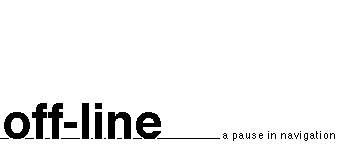 |
 |
April, 1999 |
 |
 |
April, 1999 |
| Giancarlo Livraghi gian@gandalf.it |
|
| |
|||
|
There are times when I feel uncomfortable with the internet. I've never been afraid of technology and I don't believe in horror tales about all sorts of dangers. But I am beginning to get worried about some things. Of course there are risks that we must learn to live with. If people (hackers or not) wanted to mess me up, I guess they could; but why should anyone bother to interfere with me? Occasionally I've been caught (by chance) in some form of mail bombing; but apart from the waste of time caused by a heavy download it isn't much trouble. A few idiots managed to get hold of my e-mail address and are spamming me with irrelevant offers; but canceling their mail without reading it is less trouble than being found on the phone by someone that wants to sell me an encyclopediaor some service I don't need. It's true, there are viruses... but if we are careful we can avoid infection, and if we have backup the damage is manageable. Yes, I answer almost every mail I receive, and that sometimes leads to boring correspondence; but it's heavily outweighed by unexpected messages that say something interesting, or are fun, or bring a touch of warmth and a smile. Living in the net, as in any human community, has its price. But it's worth it. The things that bother me are of another sort... inhumanity and deceit. Too many things (non only in the internet) are handled by automatic technologies that lack any human touch. Even on the telephone, answering devices can make our life difficult and boring. And even the simplest equipment can turn out to have too many unnecessary functions, that make it awfully complicated to use. The big fashion on the net now is "portals". Large doorways tarted up to look inviting, and making big promises. They lead us into a sticky tunnel built like a roach trap, so they can get us stuck where whoever bribed the doorkeeper wants us to go. Another fashion isn't new, but it's getting worse all the time: cramming software with hidden functions that lurk in our computer and do things that inexperienced people don't know - and even experienced people have a hard time finding and uninstalling. The more these "fake friendly" devices multiply, the less comfortable I feel. In 1982, John Naisbitt in Megatrends explained the concept of high tech - high touch, pointing to the fact that when a new technology is introduced it needs to be balanced by a human touch, or it will be rejected. The more we have high tech, the more we need high touch. It's no coincidence that seventeen years later John Naisbitt is writing a new book, called High tech - high touch: the co-evolution of technology and culture. It will be published in October, 1999. Communication technology has developed far beyond anything that could be imagined in 1982. In all these years, that simple principle has been proven over and over again. But it seems to be forgotten a bit too often. Look at any example of really good results on the net - you will always find a human touch. If someone asked me so summarize in one, simple concept the most important principle for success in the internet, I would say: concentrate on people, on the warmth and attention needed to gain confidence and build relationships. Technologies have made extraordinary progress and will do things that nobody today can imagine. But they need to be managed to fit human needs. Above all, high touch.
|
|||